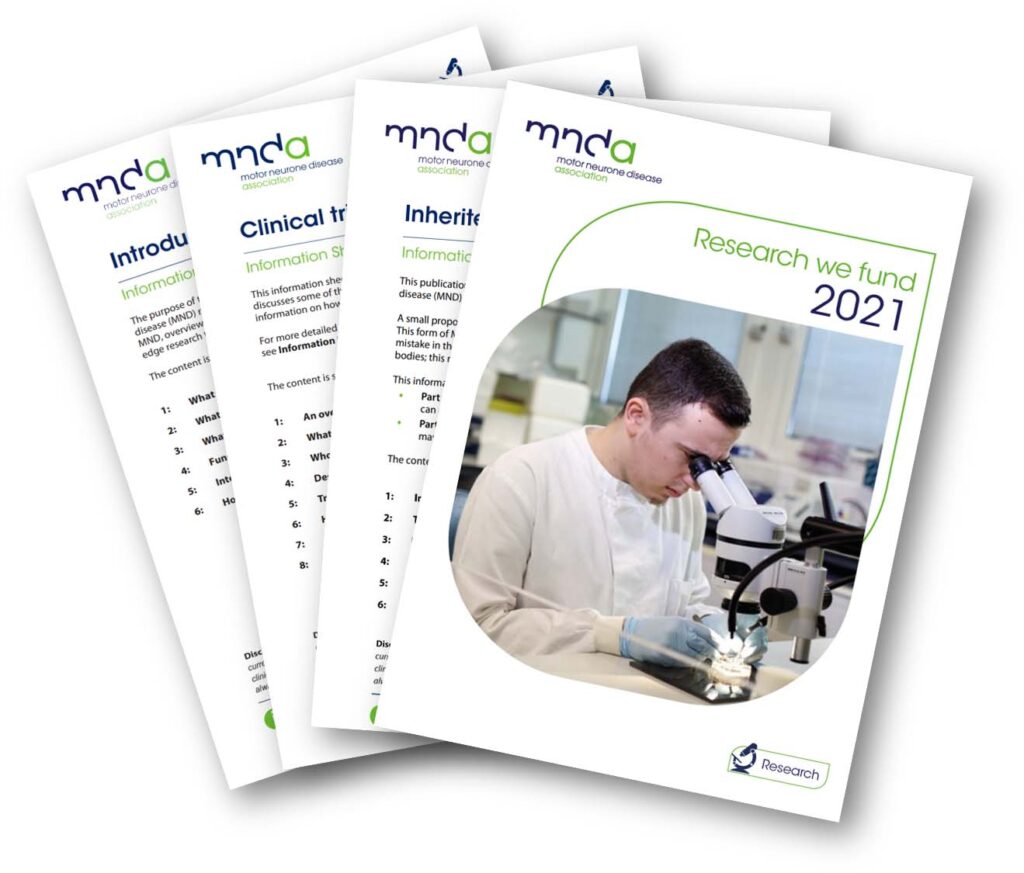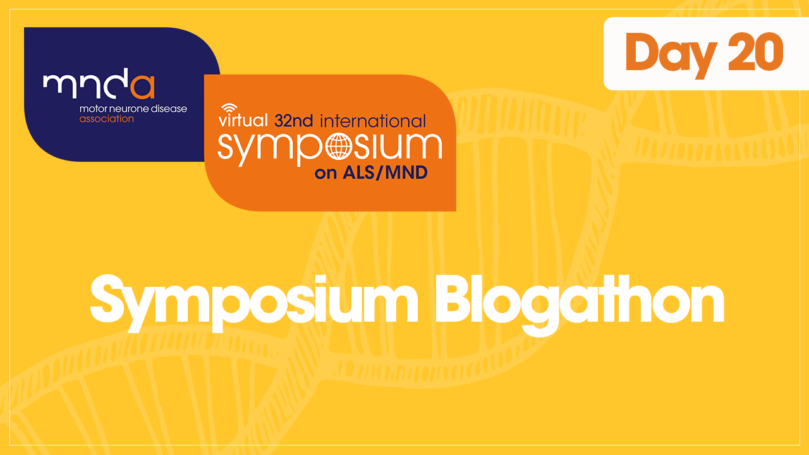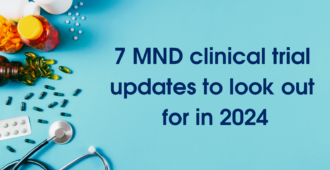This is blog number 20 in our ‘Symposium Blogathon’ – counting down to the 32nd International Symposium on ALS/MND. Numbers in bold green type correspond to the code in the abstract book. Click on the number to be redirected to the full abstract (the page may take a minute to load).
Clinical trials are research studies in human volunteers that determine whether potential treatments are safe and effective. Traditionally, clinical trials have strict guidelines about who can take part. Clinical trials are usually conducted in four progressive phases which check for safety and efficacy, establish the correct dosage and method of delivery, and assess the drug’s ability to treat the condition it is designed for.
Clinical trials take many years to complete and are extremely costly. At any stage the drug can be deemed too dangerous, or inefficient, to take into the next phase. To speed up the process, clinical trials are beginning to incorporate a biomarker element (a biological characteristic) into their design. Monitoring levels of specific biomarkers during a trial will help establish if the drug or intervention being tested is influencing disease progression. Researchers are also looking to ‘repurpose’ drugs that are already licensed to treat other diseases/conditions, as potential treatments for MND.

RELATED TOPIC
Information sheet
Clinical trials
At this year’s Symposium there are several talks and posters giving updates on current clinical trials of potential new drugs for MND. We will take a closer look at some of them in this blog, and you can read about more in blog number 19 of the Symposium Blogathon.
Reldesemtiv (COURAGE-ALS)
Reldesemtiv is intended to slow the rate of calcium release from the regulatory troponin complex of fast skeletal muscle fibres. By slowing the rate of calcium release, reldesemtiv sensitises the sarcomere to calcium, leading to an increase in muscle contractility.
In a Phase 2 trial of reldesemtiv, FORTITUDE-ALS, key eligibility criteria were time from diagnosis (no more than 24 months) and a slow vital capacity of more than 60%. The primary endpoint of change in SVC from baseline was not met. However, further analysis suggested that treatment effects were seen more strongly in participants with shorter disease duration and faster pre-study ALSFRS-R progression rates. These observations informed the design of the ongoing Phase 3 trial of reldesemtiv for MND – COURAGE-ALS.
The primary endpoint of COURAGE-ALS is a change from baseline in the ALSFRS-R total score at 24 weeks. There are several secondary endpoints. Data collected to date will be compared to FORTITUDE-ALS and presented in poster CLT-15.
FORTITUDE-ALS is also discussed in posters CLT-10 and CLT-36.
Pegcetacoplan (MERIDIAN)
Inflammation is a key underlying feature of many neurodegenerative diseases, including MND. In MND, the complement system has been implicated in disease onset and progression. The complement system is a part of the immune system that enhances (complements) the ability of antibodies to clear microbes and damaged cells from an organism, promote inflammation and attack the pathogen’s (disease causing organism) cell membrane.
Pegcetacoplan is a C3 complement inhibitor and the Phase 2 MERIDIAN clinical trial is investigating whether reducing C3 activity can improve survival and function in people diagnosed with sporadic MND.
MERIDIAN will determine the safety and effectiveness of pegcetacoplan compared to placebo in 228 participants diagnosed with sporadic MND who meet the eligibility criteria, over 52 weeks. The primary endpoint is the difference in the Combined Assessment of Function and Survival (CAFS) score at 52 weeks after treatment initiation. Following the placebo-controlled period, all participants will have the option to receive pegcetacoplan in an open-label extension (OLE) for an additional 52 weeks (CLT-17).
This is a multi-centre trial with sites in the UK. Find out more on ClinicalTrials.gov.
Masitinib
Professor Albert Ludolph presents data from the long-term follow up of a Phase 2 clinical trial of masitinib in his oral presentation C4. The Phase 2 study (also known as AB10015) previously demonstrated that masitinib, as an add-on to riluzole, slowed the rate of functional decline in patients having an ALSFRS-R progression rate from disease-onset to baseline (the beginning of the trial) of <1.1 points per month. However, the end of the trial was too early to determine overall survival (OS), so participants were followed for an average duration of 75 months (time of diagnosis until long-term OS analysis cut-off). Consistent with previously reported results, no long-term survival advantage was observed overall for the participants receiving masitinib in the trial. But, in MND patients with mild or moderate disease severity at baseline, masitinib prolonged survival by 25 months relative to those treated with riluzole alone. Mild or moderate disease severity was defined as participants that scored at least 2 on each ALSFRS-R individual component at the time of masitinib treatment initiation. These results are currently being tested in a Phase 3 confirmatory clinical trial of masitinib (also known as AB19001) of participants with an overall ALSFRS-R score of at least 26.
Long-term survival analysis from the masitinib Early Access Named Patient Programme is being discussed in poster CLT-20.
News in brief
Many other clinical trials are also being discussed including:
CLT-13 – reports on an expanded access programme for IC14, a treatment that may decrease neuroinflammation by improving T-regulatory (T-reg) cell function.
CLT-16 – discusses the Phase 1 trial of bosutinib, which is already approved for the treatment of chronic myelogenous leukemia.
CLT-22 – reports on the Phase 2a trial of PrimeC, a combination of Ciproflaxcin and Celecoxib which aims to inhibit progression of MND by acting on multiple disease pathways.
CLT-26 – discusses the Phase 1b/2 REALS-1 clinical trial of enoxacin, shown to delay deterioration of motor function in a SOD1 mouse model of MND.
CLT-27 – gives a Phase 2b/3 trial update of ibudilast (COMBAT-ALS).
CLT-30 – reports on a Phase 2 clinical trial that is testing the safety and tolerability of AT-1501 in 54 people with MND.
Stay informed
If you have come across this blog through the Symposium website, or a general search please subscribe (see top right hand corner of page) and you’ll be notified every time we upload a new article.
You can follow our research account on Twitter. We tweet about up to the minute research and will be tweeting throughout the Symposium – #alsmndsymp #drivingmndresearch
Take a look at the schedule of blogs for November as we continue counting down to the 32nd International Symposium on ALS/MND with our ‘Symposium Blogathon’.
To listen to talks live, take part in the Q&As and visit the live poster sessions, register for the International Symposium now.






